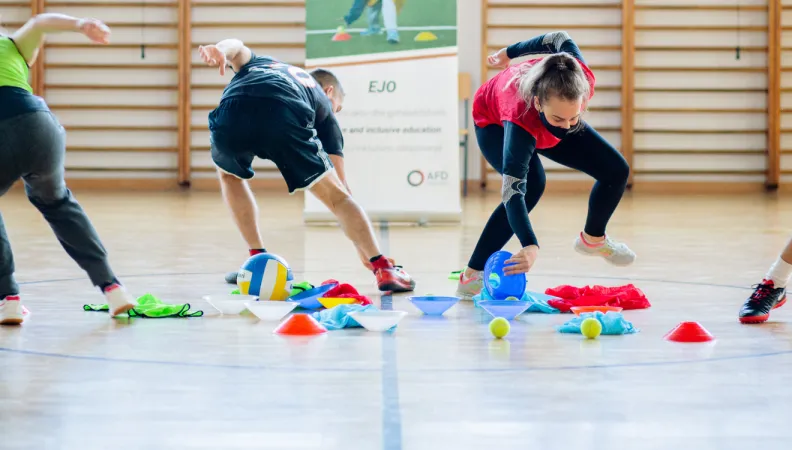Share the page
Kosovo: Using Sports to Facilitate Reconciliation
Published on

The NGO PLAY International uses sport to promote education and inter-ethnic reconciliation, which is of vital importance in a region once riven by ethnic conflict. PLAY is part of a multi-country project supported by AFD, which fosters inclusive education for some 80,000 children.
Once torn apart by ethnic rivalries, which erupted into all-out war in the 1990s, the Balkans have since begun to find ways to sow the seeds of reconciliation. However, discrimination and violence remain a problem, particularly among young people.
Teaching kids how to play together today, to be able to work together tomorrow
Operating for the first time in Kosovo in 2002, PLAY International uses playful and fun methods to raise social issues, in an effort to build a more inclusive education. From 2019 to 2023, PLAY is working with some 80,000 children, including 32,000 girls, in a project called “Ejo” (link in French) thanks to the financial support of €2 million in AFD support. (Ejo means "Tomorrow" in Kirundi, a nod to the first such education through sport project funded by the AFD and implemented in Burundi.)
The project consists of three stages. First, children play a game whose rules are explained by the teacher, in a relatively free environment. The kids develop strategies to play together, but no overriding theme is involved. The second is a game with a theme, where the teachers and/or sports leaders introduce themes and clues, monitoring the kids’ range of emotions as they experiment, discuss and interact among themselves. Third, the boys and girls discuss what they've learned, and engage in thoughtful debate.
Playdagogy: an innovative pedagogy
This approach incorporates something called Playdagogy – a pedagogical method based on the use of play to help young people learn new and sometimes difficult material. AFD's financing enables PLAY to co-create innovative educational content and teaching methods. As Kosovo begins to include such methods in its educational system, PLAY is now focusing on training teachers and educational professionals.
Some 200 primary and lower secondary teachers are already trained in Playdagogy methods. "Thanks to the training and the materials provided, I felt comfortable carrying out activities from the Anti-discrimination kit,” says Avdi Azemi, a sports teacher in the small town of Lipjan, and one of 106 teachers who have been trained so far.
"The students communicated openly, discussing many stereotypes that they have all encountered in their lives. They put themselves in the shoes of other communities, which helped to highlight their own prejudices. In this way, they not only learned to avoid prejudice, but they also learned to be a good example for the community they live with.”
Holistic Education
In the non-formal education sector, PLAY trains 138 young people involved in local NGOs to lead such activities with more than 12,000 children in their communities. During the training sessions, participants develop skills in leadership, teamwork, organization, and intercultural communication.
In an effort to build more inclusive and holistic education, the NGO works with youth clubs from different municipalities in Kosovo. The objective is to create an ecosystem of institutional, community and associative actors, which contribute to young people’s education at different stages of their life.
Training methods are also innovative. Cardio Brainstorming, for example, which combines physical activity and brainstorming methods to facilitate ideation, helped youth clubs identify their core needs. PLAY in turn organizes workshops to figure out how to meet those needs. From leadership skills development to fundraising and project management, the aim is to support them in developing their organization.
The Ejo project’s partnership approach seeks to build inclusive and quality education in both school and out-of-school sectors in Kosovo. In this way, the project contributes to several Sustainable Development Goals, from numbers 4 and 5 respectively – access to quality education and gender equality, to number 10, the reduction of inequality.
